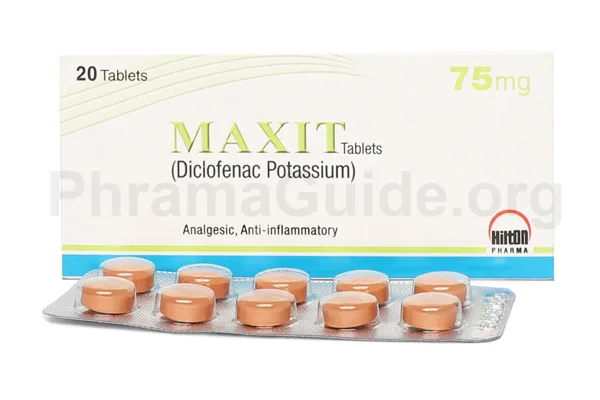Maxit tablet is a nonsteroidal anti-inflammatory drug (NSAID) that is used for its analgesic (pain-relieving) and anti-inflammatory properties. Following are some of the main uses of Maxit Tablet:
- Pain Relief: Maxit tablet is effective in providing relief from various types of pain, including musculoskeletal pain, dental pain, postoperative pain, menstrual pain, and migraines. It is often used to manage mild to moderate pain.
- Inflammation: Maxit tablet is used to reduce inflammation, it inhibits the production of certain substances in the body that contribute to the inflammatory response. It is commonly used to treat conditions associated with inflammation, such as rheumatoid arthritis, osteoarthritis, ankylosing spondylitis, gout, and other musculoskeletal disorders.
- Acute Gout: Maxit tablets can be used to manage the pain and inflammation associated with acute gout attacks. It helps alleviate the symptoms and provides relief during flare-ups.
- Dysmenorrhea: Maxit tablet is often used for the relief of pain associated with dysmenorrhea, which is severe menstrual cramping.
- Migraine: Maxit tablets can be used for the treatment of acute migraine attacks, providing relief from the associated pain and inflammation.
- Postoperative Pain: Maxit tablets may be used as part of a multimodal approach to managing postoperative pain following surgeries, such as dental procedures or orthopedic surgeries.
Off-label Uses of Maxit Tablet
- Chronic Pain: Maxit tablets may be used off-label for the management of chronic pain conditions, such as chronic low back pain or neuropathic pain. It may be prescribed in combination with other medications or as an alternative to other analgesics in certain cases. Postoperative Inflammation: While Maxit tablet is commonly used to manage postoperative pain, it may also have off-label use in reducing postoperative inflammation. It helps alleviate swelling and discomfort following surgical procedures, promoting faster recovery.
- Sports Injuries: Maxit tablets may be used for the treatment of sports-related injuries, such as sprains, strains, or tendonitis. It can help reduce pain, swelling, and inflammation associated with these injuries.

What is Maxit?
Maxit is one of the leading brands of Diclofenac Potassium, manufactured and marketed by Hilton Pharmaceuticals (Pvt) Ltd, Pakistan.
Maxit Alternatives : Other Similar Brands
Below are some similar brands, that can be used as alternatives to Maxit.
- Caflam : Novartis Pharma (Pakistan) Ltd.
- Diclorep : Sami Pharmaceuticals (Pvt) Ltd, Pakistan.
- Beflam : Batala Pharmaceuticals Pakistan.
- Detran P : Sunshine Pharmaceuticals (Pvt.) Ltd, Pakistan.
- Diclo P : Indus Pharmaceuticals (Pvt) Ltd, Pakistan.
- Sofac-P : Saffron Pharmaceuticals (Pvt) Ltd, Pakistan.
- Voltaflam : Platinum Pharmaceuticals (Pvt) Ltd, Pakistan.
- Artimov-K : Barrett Hodgson Pakistan (Pvt) Ltd.
- Artinil K : Global Pharmaceuticals, Pakistan.
- Klic-F : Tabros Pharma Pakistan.
- Catafen : Cibex (Pvt) Ltd, Pakistan.
Maxit : Available Formulations and Strengths
Presently, Maxit is available in Tablet and Injections Form with the following strengths.
Maxit Tablets : Diclofenac Potassium 50mg and 75mg strengths.
Maxit-S Injection : Diclofenac Sodium 25mg/ml strength.
Maxit-L Injection : Diclofenac Sodium 75mg/ml + Lignocaine 50mg/ml strengths
Who Should Not Use Maxit?
There are some conditions that may contraindicate the use of either Maxit tablet.
Hypersensitivity: Maxit is contraindicated in individuals who have a known hypersensitivity or allergic reaction to diclofenac or any other nonsteroidal anti-inflammatory drugs (NSAIDs). Signs of hypersensitivity may include rash, itching, swelling, or difficulty breathing. If you have a known hypersensitivity, an alternative medication should be considered.
Asthma, Nasal Polyps, and Aspirin Sensitivity: Maxit is contraindicated in individuals who have a history of asthma, nasal polyps, or aspirin sensitivity, as it may lead to worsening asthma symptoms or potentially life-threatening allergic reactions.
Active Peptic Ulcer or Gastrointestinal Bleeding: Maxit is contraindicated in individuals with an active peptic ulcer (stomach or duodenal ulcer) or a history of gastrointestinal bleeding. The use of Maxit can increase the risk of gastric and intestinal ulcers and bleeding.
Severe Heart Failure: Maxit is contraindicated in individuals with severe heart failure. It can cause fluid retention, which can worsen the condition and increase the risk of cardiovascular events.
Third Trimester of Pregnancy: Maxit is contraindicated during the third trimester of pregnancy, as it may cause harm to the developing fetus, including the potential for premature closure of the fetal ductus arteriosus and other adverse effects on fetal development.
Breastfeeding: Maxit should not be used by breastfeeding women as it can pass into breast milk and may harm the nursing infant.
What is the Recommended Daily Dosage of Maxit?
Maxit Dose for Pain and Inflammation:
- Mild to Moderate Pain: One tablet of 50mg two or three times a day, with a maximum daily dose of 150 mg.
- Acute Musculoskeletal Conditions: Two tablets of 50mg followed by one tablet of 50mg every 8 hours as needed, with a maximum daily dose of 150 mg.
Maxit Dose for Dysmenorrhea:
- One tablet of 50mg two or three times a day, with a maximum daily dose of 200 mg.
Maxit Dose for Migraine Attacks:
- One tablet of 50mg at the first signs of an impending migraine attack, with a maximum daily dose of 200 mg.
How Maxit Works?
Maxit works by inhibiting both COX-1 and COX-2 enzymes, although it has a higher affinity for COX-2. These enzymes play a crucial role in the production of prostaglandins, which are hormone-like substances involved in pain, inflammation, and fever.

Leave A Comment